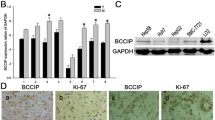Abstract
Purpose
Recent studies have identified polycomb-group gene Bmi-1 as oncogene in the generation of mouse pre-cell lymphomas, and overexpression of Bmi-1 has been found in several human tumor with the disease progress and poor prognosis of the cancer patients.
Methods
In present study, we investigated Bmi-1 expression and its prognostic significance in hepatocellular carcinoma (HCC) by performing immunohistochemical analysis, using a total of 137 HCC clinical tissue samples.
Results
High Bmi-1 expression (Bmi-1 2+ or 3+) was shown in 29.9% cases. The positive immuno-staining of Bmi-1 was not only in well/moderately-differentiated tumor cells, but also in surrounding noncancerous or cirrhotic liver tissue. Bmi-1 expression level did not correlate with any clinicopathological parameters. However, survival analysis showed that the high-Bmi-1 group had a significantly shorter overall survival time than the low-Bmi-1 group (P = 0.047). Multivariate analysis after 24 months revealed that Bmi-1 expression was a significant and independent prognostic parameter (P = 0.002) for HCC patients.
Conclusions
Our study indicated that Bmi-1 could be a candidate biomarker for long-term survival in HCC.



Similar content being viewed by others
References
Bosch FX, Ribes J, Cleries R, Diaz M (2005) Epidemiology of hepatocellular carcinoma. Clin Liver Dis 9:191–211
Breuer RH, Snijders PJ, Smit EF, Sutedja TG, Sewalt RG, Otte AP, van Kemenade FJ, Postmus PE, Meijer CJ, Raaphorst FM (2004) Increased expression of the EZH2 polycomb group gene in BMI-1-positive neoplastic cells during bronchial carcinogenesis. Neoplasia 6:736–743
Chowdhury M, Mihara K, Yasunaga S, Ohtaki M, Takihara Y, Kimura A (2007) Expression of Polycomb-group (PcG) protein BMI-1 predicts prognosis in patients with acute myeloid leukemia. Leukemia 21:1116–1122
Cui H, Hu B, Li T, Ma J, Alam G, Gunning WT, Ding HF (2007) Bmi-1 is essential for the tumorigenicity of neuroblastoma cells. Am J Pathol 170:1370–1378
Dimri GP, Martinez JL, Jacobs JJ, Keblusek P, Itahana K, Van Lohuizen M, Campisi J, Wazer DE, Band V (2002) The Bmi-1 oncogene induces telomerase activity and immortalizes human mammary epithelial cells. Cancer Res 62:4736–4745
Haupt Y, Bath ML, Harris AW, Adams JM (1993) Bmi-1 transgene induces lymphomas and collaborates with myc in tumorigenesis. Oncogene 8:3161–3164
Jacobs JJ, Kieboom K, Marino S, DePinho RA, van Lohuizen M (1999a) The oncogene and Polycomb-group gene bmi-1 regulates cell proliferation and senescence through the ink4a locus. Nature 397:164–168
Jacobs JJ, Scheijen B, Voncken JW, Kieboom K, Berns A, van Lohuizen M (1999b) Bmi-1 collaborates with c-Myc in tumorigenesis by inhibiting c-Myc-induced apoptosis via INK4a/ARF. Genes Dev 13:2678–2690
Kang MK, Kim RH, Kim SJ, Yip FK, Shin KH, Dimri GP, Christensen R, Han T, Park NH (2007) Elevated Bmi-1 expression is associated with dysplastic cell transformation during oral carcinogenesis and is required for cancer cell replication and survival. Br J Cancer 96:126–133
Kim JH, Yoon SY, Jeong SH, Kim SY, Moon SK, Joo JH, Lee Y, Choe IS, Kim JW (2004a) Overexpression of Bmi-1 oncoprotein correlates with axillary lymph node metastases in invasive ductal breast cancer. Breast 13:383–388
Kim JH, Yoon SY, Kim CN, Joo JH, Moon SK, Choe IS, Choe YK, Kim JW (2004b) The Bmi-1 oncoprotein is overexpressed in human colorectal cancer and correlates with the reduced p16INK4a/p14ARF proteins. Cancer Lett 203:217–224
Llovet JM, Burroughs A, Bruix J (2003) Hepatocellular carcinoma. Lancet 362:1907–1917
Mohty M, Yang AS, Szydlo RM, Apperley JF, Melo JV (2007) The polycomb group BMI-1 gene is a molecular marker for predicting prognosis of chronic myeloid leukemia. Blood 110:380–383
Neo SY, Leow CK, Vega VB, Long PM, Islam AF, Lai PB, Liu ET, Ren EC (2004) Identification of discriminators of hepatoma by gene expression profiling using a minimal dataset approach. Hepatology 39:944–953
Okuda K (2000) Hepatocellular carcinoma. J Hepatol 32:225–237
Parkin DM, Bray F, Ferlay J, Pisani P (2001) Estimating the world cancer burden: globocan 2000. Int J Cancer 94:153–156
Song LB, Zeng MS, Liao WT, Zhang L, Mo HY, Liu WL, Shao JY, Wu QL, Li MZ, Xia YF, Fu LW, Huang WL, Dimri GP, Band V, Zeng YX (2006) Bmi-1 is a novel molecular marker of nasopharyngeal carcinoma progression and immortalizes primary human nasopharyngeal epithelial cells. Cancer Res 66:6225–6232
Steele JC, Torr EE, Noakes KL, Kalk E, Moss PA, Reynolds GM, Hubscher SG, van Lohuizen M, Adams DH, Young LS (2006) The polycomb group proteins, BMI-1 and EZH2, are tumour-associated antigens. Br J Cancer 95:1202–1211
Tateishi K, Ohta M, Kanai F, Guleng B, Tanaka Y, Asaoka Y, Tada M, Seto M, Jazag A, Lianjie L, Okamoto M, Isayama H, Tada M, Yoshida H, Kawabe T, Omata M (2006) Dysregulated expression of stem cell factor Bmi-1 in precancerous lesions of the gastrointestinal tract. Clin Cancer Res 12:6960–6966
Thomas MB, Zhu AX (2005) Hepatocellular carcinoma: the need for progress. J Clin Oncol 23:2892–2899
van Galen JC, Muris JJ, Oudejans JJ, Vos W, Giroth CP, Ossenkoppele GJ, Otte AP, Raaphorst FM, Meijer CJ (2007) Expression of the polycomb-group gene Bmi-1 is related to an unfavourable prognosis in primary nodal DLBCL. J Clin Pathol 60:167–172
van Leenders GJ, Dukers D, Hessels D, van den Kieboom SW, Hulsbergen CA, Witjes JA, Otte AP, Meijer CJ, Raaphorst FM (2007) Polycomb-group oncogenes EZH2, Bmi-1, and RING1 are overexpressed in prostate cancer with adverse pathologic and clinical features. Eur Urol 52:455–463
van Lohuizen M, Frasch M, Wientjens E, Berns A (1991) Sequence similarity between the mammalian bmi-1 proto-oncogene and the Drosophila regulatory genes Psc and Su(z)2. Nature 353:353–355
Vonlanthen S, Heighway J, Altermatt HJ, Gugger M, Kappeler A, Borner MM, van Lohuizen M, Betticher DC (2001) The bmi-1 oncoprotein is differentially expressed in non-small cell lung cancer and correlates with INK4A-ARF locus expression. Br J Cancer 84:1372–1376
Author information
Authors and Affiliations
Corresponding author
Additional information
The first two authors contributed equally to this work.
Rights and permissions
About this article
Cite this article
Wang, H., Pan, K., Zhang, Hk. et al. Increased polycomb-group oncogene Bmi-1 expression correlates with poor prognosis in hepatocellular carcinoma. J Cancer Res Clin Oncol 134, 535–541 (2008). https://doi.org/10.1007/s00432-007-0316-8
Received:
Accepted:
Published:
Issue Date:
DOI: https://doi.org/10.1007/s00432-007-0316-8




